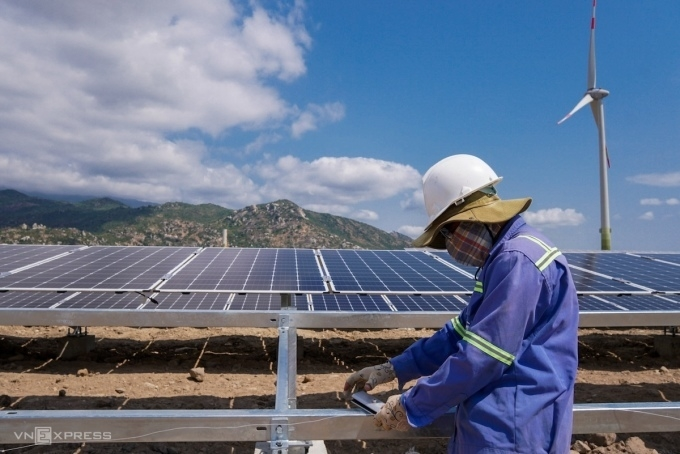Nguyen Khanh Long, deputy director of the Department of Employment (Ministry of Home Affairs), highlighted this concern at the "Human Resource Development - A Prerequisite for the Digital Economy and Green Growth" seminar on 11/8. Citing a report by the Asian Development Bank (ADB) and the International Labour Organization (ILO), Long said this risk is especially significant for small and medium-sized enterprises.
 |
Workers construct a solar power project in Ninh Thuan, 2/2019. Photo: Quynh Tran |
Workers construct a solar power project in Ninh Thuan, 2/2019. Photo: Quynh Tran
Pham Vu Quoc Binh, deputy director of the Department of Vocational Education and Continuing Education (Ministry of Education and Training), elaborated on the shortage. He stated that only 3-5% of Vietnamese workers are employed in green sectors, primarily renewable energy and organic agriculture. This figure is low, considering Vietnam's goal of net-zero emissions by 2050.
Beyond the limited scale, Binh noted a lack of highly skilled professionals in designing, operating, and maintaining green technologies, such as environmental engineers, waste management experts, and renewable energy personnel.
This skills gap slows the implementation of green projects, impacting environmental commitments at both the corporate and national levels. More seriously, it could lead to social inequality as polluting industries decline, potentially causing job losses.
Given this risk, the deputy director of employment recommended businesses and authorities invest in retraining and specialized training aligned with green transition needs and inclusive employment policies.
Specifically, Long proposed a national strategy for human resource development linked to digital transformation and green growth. He suggested integrating workforce development goals and solutions into the National Master Plan, the Green Growth Strategy, and employment policy plans. Priority sectors by 2030 should be clearly defined, such as artificial intelligence, renewable energy, and low-carbon logistics.
Additionally, a national training program for digital and green skills with specific roadmaps for each profession is necessary. This program requires collaboration between the government, businesses, and training institutions to ensure practical and relevant instruction. Long also encouraged businesses to participate in on-the-job training and provide nationally recognized skill certifications.
Vi Thi Hong Minh, deputy director of the Employers' Office (Vietnam Chamber of Commerce and Industry), discussed necessary skills. She stated businesses need employees with environmental awareness in daily tasks, such as conserving electricity and water, sorting waste, and reducing material consumption. Employees are also expected not only to "do the right things" but also to propose improvements and create new value.
Employing green-skilled personnel helps businesses increase revenue and meet environmental commitments. Minh cited a bioplastics company in TP HCM that reduced plastic waste by 30% thanks to an initiative from its workers. She also mentioned a resort in Da Nang that increased bookings after receiving international sustainability certification.
The World Bank projects green jobs in Vietnam will rise sharply from 3.6% to 41% of total jobs in the near future. This green skills shortage isn't unique to Vietnam. According to a recent sustainable development report by Manpower Group, 91% of businesses lack the green workforce to achieve sustainability goals, with the supply shortage projected to last until 2030.
A joint report by the ILO and the United Nations Environment Programme (UNEP) indicates the green transition could create 25 million new jobs globally by 2030 while mitigating job losses from supply chain restructuring. This is particularly significant given potential large-scale job cuts in banking, logistics, and customer service due to digital transformation and AI applications.
Thuy Truong












